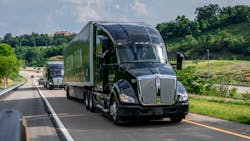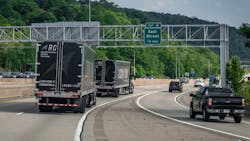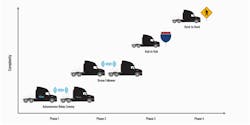Autonomous trucking company Locomation has a new eight-year agreement with Stevens Trucking to optimize autonomous vehicle routes near Oklahoma City in anticipation of Stevens deploying self-driving trucks on six-lane segments by the end of 2023. Stevens plans to deploy up to 500 trucks equipped with Locomation’s Autonomous Relay Convoy (ARC) systems.
Locomation estimates that carriers using its ARC system will be able to deliver twice as much freight, twice as far, and twice as fast. The ARC technology is designed to allow trucks to keep moving 20 hours per day. The trucks used are, according to the company’s website, “an aftermarket retrofit, with sensors (cameras, lidar, and radar), vehicle interface, and compute power with steering and braking systems optimized for autonomy.”
See also: Waymo to test autonomous Cascadia on public roadways
After mapping autonomous relay networks throughout Oklahoma City’s freight corridors, Stevens plans on deploying convoys equipped with ARC technology out of its terminal near Interstate 44. The trucks will have access to I-35 and I-44. Stevens plans to deploy on those six lane segments, which move about $9 billion of freight annually. Approximately 18% of all freight in the country at some point flows within 500 miles of Oklahoma City, noted Cole Stevens, VP of sales for Stevens Trucking.
“We knew we needed to lock in our place at the front of the line of this technology,” he said. Stevens Trucking, which has more than 400 employees and generates over nine figures of revenue annually, met with Locomation in mid-2021 and tested its autonomous relay network.
While AV technology won’t be widely adopted for at least a few years, according to Locomation CCO Glynn Spangenberg, Locomation views the ARC system as a stepping stone toward further autonomy and fully driverless trucks.
“[The trucks] won’t be ready for a couple of years,” Spangenberg said. “What does it mean to begin now? It means preparing the lanes.”
In addition to preparing the autonomous relay network, Locomation is identifying shippers and what parts of their freight work for the ARC solution within the designated lanes. Locomation also plans to ramp up safety testing within the next six weeks.
Because AV technology is still developing, Cole Stevens chose Locomation’s convoy system, saying, “Ultimately we feel like this will be the safest methodology” to use AVs.
Locomation is aiming for pilots in 2023, with full commercial systems starting to deploy in late 2023 and improving scale in 2024 and beyond. It currently operates a test fleet of 13 trucks and is planning to have about 30 test trucks by the end of 2023. The company has signed agreements to provide 3,100 ARC kids when the technology is deployed, which Locomation says is on track to begin in the second half of 2023.
See also: Stevens Trucking: How one Oklahoma carrier tripled in size
Tackling driver shortages and fleet sustainability
Locomation asserts that its ARC technology can reduce greenhouse gas emissions by 22%, reduce idle time by up 90, and improve fuel efficiency up to 8%.
Locomation CEO Meriçli said the first factor in fuel savings is the reduced idle time due to the trucks’ near-continuous operating model. The second is the lack of air resistance upon the second truck as it travels in the wake of the first—which also disallows turbulence from building up behind the first truck and adding to its drag as well.
Locomation and Stevens said they are aware of broad concern that self-driving trucks could put truckers out of work, but they maintain that the tethering technology will allow more freight to be hauled during a longstanding driver shortage, augment drivers’ capabilities, and introduce a new specialization that drivers could occupy.
See also: Gatik and Cummins integrate autonomous driving tech with advanced powertrain
“These autonomous truck drivers will be highly skilled,” Spangenberg said, adding that drivers using the ARC system will need a skillset beyond that of current drivers to operate the convoy.
Cole Stevens said the carrier has seen 100% growth within the past four years and expects the company to grow more. “We’re going to need people," he said. "We’re not going to replace truck driving jobs, we’re going to create truck driving jobs. We’ll still have non-autonomous trucks.”
Stevens said he hopes the autonomous trucks’ ability to operate 20 hours out of the day will allow drivers to make longer trips in a shorter time, allowing them to spend more time at home. He also said he hopes the carrier will be able to pass on a portion of any additional revenue it earns to drivers' paychecks.
“We chose Locomation because we’re convinced they are bringing to market the safest and most viable turnkey model to enable us to deploy autonomous technology in the near term," Kenney Stevens, CEO of Stevens Trucking, said in a press release. "For Stevens, this is an incredible opportunity to establish a strong early mover presence in the lanes we’ve chosen to launch in and enable us to double our market share.”
About the Author
Scott Keith
Scott Keith is a former fleet owner digital editor, who was on staff from 2022 to 2023.



